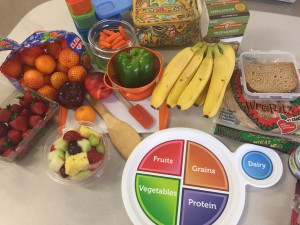March 23, 2020 by Amy Kimberlain
Myths and Facts About Pregnancy Nutrition

Expecting a baby is usually one of the most exciting times in a woman’s life. But between picking names, baby showers and other fun activities over the nine months of gestation, there are a number of health considerations important to producing a healthy baby and keeping mom-to-be well. Nutrition during pregnancy is one of the most important, according to doctors.
Advice about eating healthy when expecting a baby
“The goal of advising patients about proper nutrition while they’re pregnant is to help the mother be as healthy as possible and get the baby off to a good start,” said Mabel Marotta, M.D., an obstetrician and gynecologist affiliated with West Kendall Baptist Hospital.
Adhering to a healthy diet can minimize risks associated with poor nutrition during pregnancy, according to Dr. Marotta. He helps debunk some of the most common myths about nutrition during pregnancy.
Common Pregnancy Myths
Myth: Prenatal vitamins are only for women who have vitamin or mineral deficiencies.
Fact: Multivitamins specially made for pregnant women provide minerals and supplements that help keep mothers-to-be well and promote healthy fetal development. Most doctors recommend women start taking prenatal vitamins preconception and throughout pregnancy.
“I prescribe prenatal vitamins to all of my patients,” Marotta said. “There are many different brands and types that can have long lists of ingredients. What’s important is to take the ones that provide the right amount of basic minerals to keep the mom healthy and promote healthy brain and physical development in the baby to help decrease the risks of fetal abnormalities.”
The benefits of taking vitamins during pregnancy are backed by leading health institutions and research studies alike. The U.S. Centers for Disease Control and Prevention (CDC) recommends women start taking multivitamins when they are planning to become pregnant. The most important nutrients the vitamins need to contain include folic acid, iron, omega-3 fatty acids, calcium and Vitamin D. The risk of miscarriage was reduced by 79 percent in women who took multivitamins during early pregnancy, according to a recent study conducted by the National Institute of Child Health and Human Development.
The vast number of prenatal vitamins available – in multiple forms and varying prices – can make it difficult for women to pick the one that’s right for them.
“The vitamin your doctor prescribes is the best one for you,” Dr. Marotta said. He recommends three or four different brands to each patient, based on her budget and what type he thinks she will tolerate best. For women experiencing heavy morning sickness and are vomiting, there are certain vitamins that provide the minimum basic minerals in a form they can tolerate, she added.
Myth: You’re eating for two and need extra calories.
Fact: Most pregnant women overeat, according to the (CDC). The American College of Obstetricians and Gynecologists provides guidelines for healthy weight gain during pregnancy.
“Obesity is one of the biggest problems when it comes to pregnancy risks,” Dr. Marotta said. “Being obese at conception puts a woman in the high-risk pregnancy category. The same goes for women who put on too many extra pounds while pregnant. These women are more likely to deliver by c-section. The procedure, while generally safe, comes with risks associated with any type of surgery and is best to avoid if possible.”
Dr. Lopez-Linnikov recommends sticking with a regular diet, balanced with the right amount of whole grains, fruits and vegetables, protein, dairy and healthy fats. She also cautions against foods to avoid, especially items with raw or unpasteurized ingredients.
“It’s OK to eat clean, but eating things like raw meat or milk straight from a cow is unsafe for pregnant women and unborn babies,” she said. “Some people go to extremes to follow certain diets they consider ‘natural,’ but pregnant women can’t afford to take risks and need to eat foods that are cooked properly and pasteurized.”
Pregnancy affects a woman’s immune system, making her and her unborn baby more susceptible to bacteria, viruses and parasites that can cause food-borne illnesses. Some “bugs” like Listeria and Toxoplasma can infect the baby and cause serious health problems – with or without symptoms of feeling “sick” – according to the CDC. Babies are also sensitive to toxins that can be in food the mother eats, such as mercury in certain kinds of fish, like shark, swordfish, king mackerel, and golden or white snapper.
“Any food that has the potential to be toxic should be avoided,” Dr. Marotta said.
Other foods to avoid during pregnancy include raw cookie dough or cake batter and premade salads from stores, such as ham salad, tuna salad and chicken salad.
Myth: Caffeine amounts can stay the same.
Fact: Caffeine is considered a category “C” medication, meaning there are risks associated with consuming it during pregnancy. Research at the National Institutes of Health has shown that drinking too many caffeinated drinks increases the risk of miscarriage.
“I usually tell my patients to cut out caffeine as much as possible,” Dr. Marotta said. “Each patient is different. Women who tell me they feel anxious or are sleep deprived can benefit from less or no caffeine, especially when pregnant since these conditions can increase risks associated with pregnancy. If the risk of drinking caffeine while pregnant outweighs the benefits, the general rule to follow is not to use it.”
Myth: Eating too much sugar causes gestational diabetes.
Fact: If a woman has followed a controlled diet that limits the amount of added sugar and is not genetically predisposed to becoming diabetic, her risk of gestational diabetes is low.

“Too much sugar in our diets is challenging all of us and is a big problem,” said Dr. Marotta . “During pregnancy, the placenta produces a hormone that’s resistant to insulin and that’s why sugar levels are checked at different stages. If a pregnant woman’s blood sugar levels elevate too much, they can most often be lowered with a fixed, controlled diet.”
The bottom line about pregnancy nutrition is an age-old adage in medicine. Dr. Marotta says, “Listen to your doctor’s advice. Follow a regular and balanced diet; avoid dangerous or risky foods and control weight gain. These are the basic keys to a nutritious pregnancy.”
top stories












There are no comments